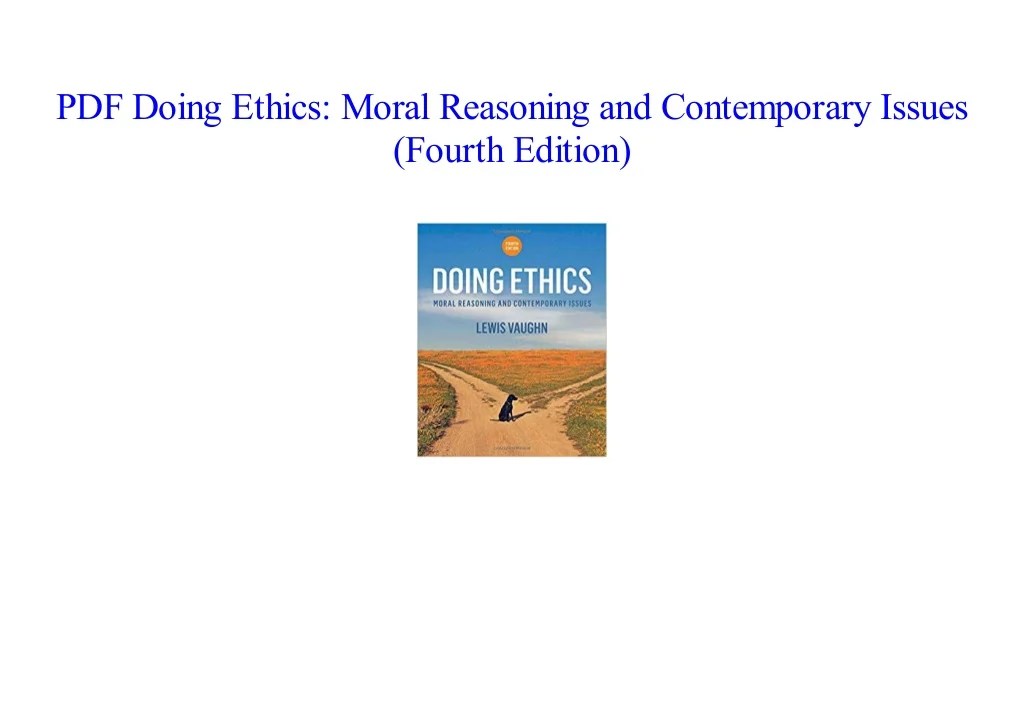Doing ethics moral reasoning theory and contemporary issues sixth edition – In “Doing Ethics: Moral Reasoning, Theory, and Contemporary Issues, Sixth Edition,” we embark on an exploration of the intricate tapestry of ethical reasoning and its profound implications for navigating the moral complexities of our time. This comprehensive guide delves into the foundational principles of moral reasoning, equipping readers with the tools to critically examine ethical dilemmas and make informed decisions.
Through engaging discussions and real-world examples, the book unravels the complexities of ethical theories, from deontology and utilitarianism to virtue ethics. It illuminates the nuances of contemporary moral issues, such as environmental sustainability, social justice, and emerging technologies, fostering a deep understanding of their ethical dimensions.
Introduction: Doing Ethics Moral Reasoning Theory And Contemporary Issues Sixth Edition

In contemporary society, ethical reasoning has become increasingly significant as individuals and organizations navigate complex moral dilemmas. It provides a systematic approach to understanding and resolving ethical issues, enabling us to make informed and responsible decisions.
Ethical reasoning involves the application of key concepts and principles, such as autonomy, beneficence, non-maleficence, and justice. These principles guide our actions and help us determine the right course of conduct in various situations.
Ethical Theories

Deontology
Deontological theories focus on the intrinsic rightness or wrongness of actions, regardless of their consequences. Immanuel Kant’s categorical imperative is a well-known example of a deontological theory, emphasizing the importance of acting according to universal moral laws.
Utilitarianism
Utilitarian theories prioritize the maximization of overall well-being or happiness. They evaluate actions based on their consequences and aim to produce the greatest good for the greatest number of people.
Virtue Ethics, Doing ethics moral reasoning theory and contemporary issues sixth edition
Virtue ethics emphasizes the cultivation of virtuous character traits, such as courage, honesty, and compassion. By developing these virtues, individuals can make ethically sound decisions and live fulfilling lives.
Contemporary Moral Issues

Bioethics
Bioethics addresses ethical dilemmas in healthcare, such as the allocation of scarce resources, end-of-life decisions, and genetic engineering. These issues challenge traditional ethical principles and require careful consideration of the value of human life.
Environmental Ethics
Environmental ethics explores the moral obligations humans have towards the environment. It addresses issues such as climate change, pollution, and animal welfare, emphasizing the need for responsible stewardship of natural resources.
Business Ethics
Business ethics examines ethical challenges in the business world, including issues of corporate social responsibility, fair trade, and workplace discrimination. It promotes ethical conduct in business practices and decision-making.
Ethical Decision-Making

Problem Identification
The first step in ethical decision-making is to clearly identify the ethical issue or dilemma at hand. This involves gathering relevant information and understanding the different perspectives involved.
Stakeholder Analysis
Identifying the stakeholders affected by the decision is crucial. This includes considering their interests, values, and potential impact.
Value Clarification
Clarifying the ethical values and principles that guide our decisions is essential. This helps us prioritize competing values and make ethically sound choices.
Ethical Reasoning in Practice
Case Study: Medical Triage
In a disaster situation, a doctor faces the ethical dilemma of deciding which patients to treat first given limited resources. Ethical reasoning helps the doctor consider factors such as the severity of injuries, the likelihood of survival, and the principles of justice and fairness.
Real-World Example: Whistleblower Protection
Ethical reasoning plays a vital role in protecting whistleblowers who expose unethical or illegal activities. It highlights the importance of balancing the need for accountability with the protection of those who speak out.
Questions and Answers
What is the significance of ethical reasoning in contemporary society?
Ethical reasoning provides a framework for understanding and addressing the complex moral issues that arise in our rapidly changing world. It enables us to critically evaluate different perspectives, identify underlying values, and make informed decisions that align with our ethical principles.
How does “Doing Ethics” help us navigate contemporary moral issues?
“Doing Ethics” provides a comprehensive analysis of pressing moral issues, such as environmental sustainability, social justice, and emerging technologies. It explores the ethical dimensions of these issues, considering diverse viewpoints and offering practical guidance for ethical decision-making.
What are the key ethical theories discussed in the book?
The book examines major ethical theories, including deontology, utilitarianism, and virtue ethics. It compares and contrasts their fundamental principles and implications for moral decision-making, providing readers with a deeper understanding of the different ethical frameworks.